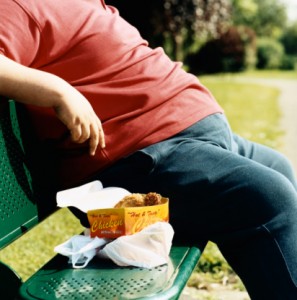The Orwellian Efficiency of a "Being Fat" Tax

(Digital Vision)
The Danish policymakers who implemented the world’s first “fat tax” last week are remarkable not for their directness in addressing the growing Western challenge of obesity, but for their indifference to the plight of the poor, their deference to political correctness at the cost of economic efficiency, and their willingness to punish certain segments of society.
The Danes may have been the first, but headlines throughout the western world assessed the likelihood of other countries to follow, including this one. A fat tax in the U.S. (or the U.K. for that matter) would add to the growing thicket of regulations across local and federal jurisdictions intended to address weight gain and the external costs that obesity imposes on society— both through higher private insurance premiums and ballooning government outlays for the uninsured.
Whether the tax will improve health outcomes is an empirical question that won’t be answered for several years or more. Steep “sin taxes” on cigarettes, combined with anti-smoking campaigns, have achieved reductions in smoking rates. In other contexts, empirical evidence suggests that dramatic price increases are required to induce measurable changes in behavior, let alone health outcomes.
Regardless, there are plenty of other reasons to hope that we stop at importing fat-laden foods from the Danes and leave their fat tax over there.
First, a fat tax is regressive. That the surfeit of cheap, nutritionally bankrupt calories principally imperils the poor is a popular refrain among health and nutrition advocates. Low-income households are more likely than wealthy cohorts to eat fatty fast food and to have less access to fresh, healthy food. A fat tax, then, hits the poor harder than it does the rich, who can better afford the “good” unsaturated fats and avoid the “bad” saturated and trans fats. Given that the U.S. economy is still struggling in the worst economic downturn since the Great Depression, now would seem an inopportune time to impose an additional burden on the poor.
Second, a fat tax is inefficient. It achieves incremental improvements in health outcomes at a greater cost than other policies. Like taxes on sodas, candy and chips, and like mandatory calorie labeling laws, a fat tax is an indirect mechanism for reducing obesity-related health care costs. Rather than taxing the outcome that causes the problem directly, as demanded by economic efficiency, it instead taxes an input into the production of health outcomes.
Taxing the input allows substitutions among other inputs in the production function that impose costs and undermine the impact of the tax. For instance, if we tax saturated fats, people may eat less fatty junk food like ice cream, but more sugary food like candy. Or they may reduce consumption of saturated fats but also reduce exercise (as this study from the Journal of Political Economy suggests). Both substitutions make consumers worse off as they deviate from their preferred consumption bundle and potentially yield no benefit to society from reduced obesity costs. Thus, an efficient policy taxes being fat, not eating fat.
Finally, Denmark’s fat tax is poorly targeted. It punishes those who won the genetic lottery and can seemingly eat whatever they want without serious consequence to their health. It also punishes those who, by virtue of their work or their devotion to the treadmill, burn enough calories to afford junk food. The dis-utility borne by these individuals contributes to the costs of the fat tax and yields no benefits to society.
If policymakers were serious about implementing efficient obesity policy, they would have to tax being fat, not eating fat, by charging individuals for each “overweight” pound they’re carrying. It’s an idea so repugnant that even the most heartless economist surely wouldn’t endorse it. In fact, it’s so politically incorrect that perhaps only the folks at Irish airline Ryanair could embrace it. (In 2009, they floated the idea of a passenger-weight-based fee and have also broached such taboo topics in the airline industry as fees for use of airplane lavatories and cheap tickets for standing-room-only airplane cabins.)
Could an efficient “being fat tax” actually be implemented? Sure, so long as you have an affinity for the dystopian Oceania in Orwell’s 1984. We already have federal guidelines for determining obesity, at least to a first approximation. And as part of the looming expansion of government control of the health care industry, one could imagine compelling doctors to report patient pounds to the IRS, which would then have to collect the fat levy annually with income taxes.
Of course, some individuals are genetically predisposed to weight gain. The being fat tax would have to be sensitive to that, perhaps by granting deductions to those who are diagnosed with genetic conditions or other impairments that hinder their capacity to keep the pounds off. Doctors could report such conditions to the IRS, which would use existing audit powers to make sure people aren’t cheating on their taxes. As if the current tax code and looming public healthcare system aren’t complicated enough.
Yes, the being fat tax is dystopian, and we shouldn’t expect to see it promulgated from Washington or London or Paris anytime soon, for a lot of reasons. But it is also an economically efficient response to the rising social costs of obesity and underscores the efficiency losses that we must accept as the price of compassion and political correctness — objectives which typically do not preoccupy economists.

Comments